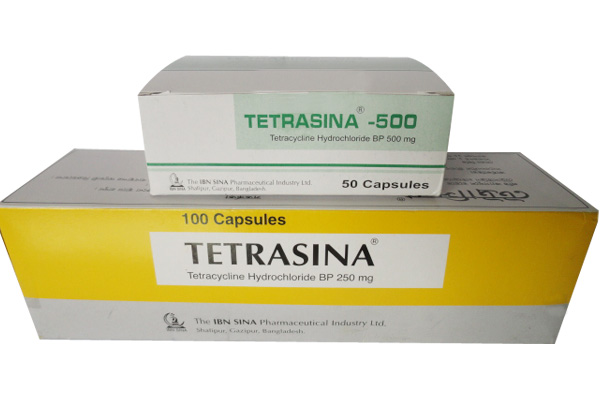
TETRASINA
TETRACYCLINE HYDROCHLORIDE BP
| NAME | STRENGTH | PACK SIZE | DOSAGE FORM |
|---|---|---|---|
| TETRASINA 250 MG | 250 MG | 100 S | CAPSULE |
| TETRASINA 500 MG | 500 MG | 50 S | CAPSULE |
Tetrasina Capsule: Each capsule contains Tetracycline 250 mg as Tetracycline Hydrochloride BP. Tetrasina 500 Capsule: Each capsule contains Tetracycline 500 mg as Tetracycline Hydrochloride BP.
Tetrasina (Tetracycline) is a broad-spectrum antibiotic which is bacteriostatic for many bacteria, rickettsiae, chlamydia, mycoplasma and brucella. It exerts its antimicrobial effect by inhibiting protein synthesis. After a single oral dose of Tetracycline peak plasma concentration is attained in 2 to 4 hours. The drug's half-life is in the range of 6 to 9 hours. Because of its enterohepatic circulation, Tetracycline may be present in the blood for a long time after cessation of therapy.
Tetrasina is indicated for the treatment of infection caused by the susceptible organisms. Typical indications include -Ear, nose and throat infection: Sinusitis, tonsilitis, pharyngitis, acute otitis media. Respiratory tract infection: Acute and chronic bronchitis (exacerbation), lobar and bronchopneumonia, atypical pneumonia, lung abscess. Gastro-intestinal tract infection: Amoebic dysentery, bacillary dysentery, enteritis. Hepatic infection: Cholangitis, cholecystitis. Venereal diseases: Gonorrhoea, syphillis (Primary stage). Genito-urinary tract infection: Pyelonephritis, cystitis, urethritis, prostatitis, epididymitis. Rickettsial infection: Typhus fever, spotted fever. Chlamydial infection: Psittacosis, trachoma, non-gonococcal urethritis, chlamydial conjunctivitis, lymphogranuloma venereum. Mycoplasmal infection: (caused by Mycoplasma pneumoniae) other infections: Bacterial endocarditis, sepsis, thrombophlebitis, Bacterial meningitis, whooping cough, brucellosis (in combination with other antimicrobial agents), actinomycosis, anthrax, acne. Tetracycline is also used in the treatment of plague with Streptomycin.
Adult: Usually 250 to 500 mg every 6 hour by mouth. Higher doses up to 3 or 4 gm daily have occasionally been given in resistant case. Gonorrhoea: 500 mg 4 times daily for 7 days. Non-gonococcal urethritis: 500 mg 4 times daily for 7-14 days. Primary, secondary or latent syphilis: 500 mg 4 times daily for 15 days. Acne vulgaris: 500 mg twice daily for 3 months, reduced to 250 mg twice daily for a further 3 months. Children: Tetracycline is not suitable for children under 12 years of age.
Pregnancy and lactation, renal insufficiency, systemic lupus erythematous, history to hypersensitivity.
Tetracycline should be taken either an hour before or 2 hours after meal. The drug should not be administered concurrently with mask, alkali and antacid.
Nausea, vomiting, diarrhoea, headache, superinfection with resistant organisms
Tetracycline should not be used during pregnancy because of the risk of hypertoxicity in the mother as well as the effects on the developing foetus. Use in pregnancy potentially during breast-feeding and in children up to the age of 8, or some authorise say 12 years, may result in impaired bone growth and permanent discoloration of the child's teeth.
Impaired absorption with antacids containing divalent and trivalent cations (e.g. Al, Ca, Mg), Fe, Zn and Na bicarbonate preparations, kaolin-pectin, bismuth subsalicylate, sucralfate, strontium ranelate, colestipol and colestyramine. May interfere with the bactericidal action of penicillin. May potentiate the effect of anticoagulants. May decrease efficacy of oral contraceptives. Nephrotoxic effects may be exacerbated by diuretics or other nephrotoxic drugs. May increase the hypoglycaemic effect of insulin and sulfonylureas in patients with DM. May increase toxic effects of ergot alkaloids and methotrexate.
In case of overdosage, discontinue medication, treat symptomatically and institute supportive measures.
Tetracycline is not dialyzable.
Store between 20-25° C
Tetrasina Capsule: Box contains 100 (10x10's) capsules in Aluminium strip.
Tetrasina 500 Capsule: Box contains 50 (10x5's) capsules in Aluminium strip.
